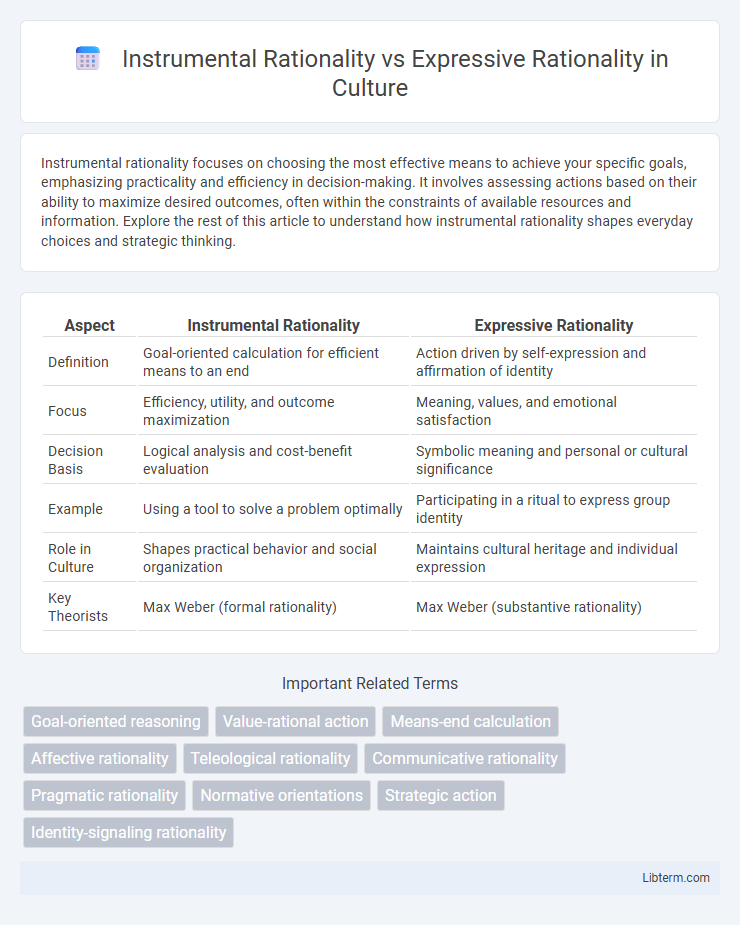Instrumental rationality focuses on choosing the most effective means to achieve your specific goals, emphasizing practicality and efficiency in decision-making. It involves assessing actions based on their ability to maximize desired outcomes, often within the constraints of available resources and information. Explore the rest of this article to understand how instrumental rationality shapes everyday choices and strategic thinking.
Table of Comparison
| Aspect | Instrumental Rationality | Expressive Rationality |
|---|---|---|
| Definition | Goal-oriented calculation for efficient means to an end | Action driven by self-expression and affirmation of identity |
| Focus | Efficiency, utility, and outcome maximization | Meaning, values, and emotional satisfaction |
| Decision Basis | Logical analysis and cost-benefit evaluation | Symbolic meaning and personal or cultural significance |
| Example | Using a tool to solve a problem optimally | Participating in a ritual to express group identity |
| Role in Culture | Shapes practical behavior and social organization | Maintains cultural heritage and individual expression |
| Key Theorists | Max Weber (formal rationality) | Max Weber (substantive rationality) |
Defining Instrumental Rationality
Instrumental rationality refers to the process of reasoning focused on selecting the most efficient means to achieve a specific goal or objective, emphasizing practical outcomes and utility maximization. It involves cost-benefit analysis and strategic decision-making where actions are evaluated based on their effectiveness in reaching desired ends. This concept is central in economics, game theory, and decision sciences, where behavior is modeled as goal-oriented and utility-driven.
Defining Expressive Rationality
Expressive rationality refers to decision-making driven by the desire to affirm identity, values, or group loyalty rather than solely achieving efficient outcomes. It emphasizes the symbolic meaning and social function of actions over practical effectiveness. This concept contrasts with instrumental rationality, which prioritizes goal-oriented, cost-benefit calculations to optimize results.
Historical Origins of Rationality Concepts
Instrumental rationality and expressive rationality trace their historical origins to the works of Max Weber, who distinguished rational actions based on goal-oriented efficiency from those driven by value-expression and identity affirmation. The development of these concepts reflects the broader intellectual context of the Enlightenment and sociological theory, emphasizing the contrast between means-end calculation and symbolic meaning in human behavior. This distinction has influenced contemporary analyses in sociology, philosophy, and economics, highlighting different rationality modes in shaping societal norms and individual decision-making.
Key Differences Between Instrumental and Expressive Rationality
Instrumental rationality focuses on achieving specific goals efficiently through logical planning and means-end calculation, emphasizing objective outcomes and practical utility. Expressive rationality prioritizes the expression of values, emotions, or identity, where actions are guided by personal or cultural significance rather than purely pragmatic success. The key difference lies in instrumental rationality's goal-oriented utility maximization versus expressive rationality's emphasis on symbolic communication and intrinsic meaning.
Practical Examples of Instrumental Rationality
Instrumental rationality involves making decisions based on efficient means to achieve specific goals, exemplified by a business optimizing its supply chain to reduce costs and increase profit margins. In everyday life, choosing a fuel-efficient car to minimize travel expenses demonstrates instrumental rationality by prioritizing practical outcomes. Investors applying quantitative analysis to maximize returns on their portfolios further illustrate this goal-oriented, efficiency-driven decision-making process.
Practical Examples of Expressive Rationality
Expressive rationality manifests in actions that prioritize identity, values, or emotional expression over efficiency or utility, such as participation in cultural rituals, political protests, or artistic creation. For instance, individuals joining a protest may prioritize conveying solidarity and moral stance rather than achieving immediate policy change. Similarly, artisans crafting traditional artwork often emphasize authentic cultural expression rather than maximizing commercial profit.
Instrumental Rationality in Decision-Making
Instrumental rationality in decision-making focuses on selecting actions that effectively achieve specific goals by optimizing resource use and outcomes. This approach relies on logical evaluation and cost-benefit analysis to maximize efficiency and predictability in reaching desired objectives. Emphasizing measurable results, instrumental rationality prioritizes practical solutions over emotional or value-driven considerations.
Expressive Rationality in Social Behavior
Expressive rationality in social behavior emphasizes actions that reflect personal values, identity, and emotional fulfillment rather than purely achieving external goals or efficiency. It plays a crucial role in forming group identities, cultural norms, and social cohesion by prioritizing authenticity and symbolic meaning in interactions. This form of rationality often drives behaviors that reinforce social bonds and collective self-expression over instrumental outcomes.
Impacts on Policy and Governance
Instrumental rationality prioritizes efficiency and outcome-driven decision-making, shaping policies that emphasize measurable results and resource optimization. Expressive rationality, focusing on values and identity, influences governance by embedding cultural norms and public sentiment into policy frameworks. Balancing these rationalities enhances adaptive governance, enabling policies to align with both practical goals and societal values for sustainable impact.
Balancing Instrumental and Expressive Approaches
Balancing instrumental and expressive rationality involves harmonizing goal-oriented, efficiency-driven decision-making with actions motivated by identity, values, and emotional expression. Effective strategies integrate pragmatic problem-solving with authentic self-expression, fostering decisions that are both functionally effective and personally meaningful. This balance enhances adaptive capacity in complex social and institutional contexts by aligning outcomes with individual and collective purpose.
Instrumental Rationality Infographic

 libterm.com
libterm.com